
It’s important we protect ourselves from illness or injury during clean-up and recovery following the initial impact of a disaster.
The main health risks include injury, skin infections, mosquito-borne infections, and illness from eating or drinking contaminated food or water.
There are simple things you can do to protect yourself:
- Keep out of floodwater
- Wash your hands often
- Wear protective clothes such as long-sleeve shirts, eyewear, heavy-duty gloves and sturdy footwear
- Cover cuts and wounds with waterproof dressings
- Wear sunscreen and a hat when working outdoors, and drink plenty of water
- Wear a P2 face mask as needed
- Ensure generators and pumps are situated in well-ventilated areas.
Flood safety
If you come across water over the road – the safest and smartest decision for you, your passengers, and those around you is to stop and turn around. Stay safe by never driving through floodwater.
When floodwater starts to go down, don’t drive over the roads until the road is open again. Sometimes the road damage is not known until the road is completely dry and is being driven on again.
Drive carefully on roads that have been reopened because they may still be drying out.
Food safety
If you lose power, keep the fridge door closed as much as possible while the power is off. A closed fridge should keep food cold for four hours.
It’s safest to throw out food that could be contaminated. This includes:
- any food that has been in contact with contaminated water, including floodwater
- food that has an unusual smell, colour or texture
- refrigerated food that has been left unrefrigerated or above 5°C for more than four hours
- frozen food after 48 hours if the freezer is full, or after 24 hours if the freezer is half-full. If frozen food has partially thawed, do not re-freeze. The food should be eaten as soon as possible or disposed of.
- canned food if the can is open, swollen, damaged or has a missing or damaged label.
Mosquitos
Mosquito numbers can increase after severe weather events as standing water from heavy rainfall and flooding provides the perfect conditions for mosquito breeding. Increased numbers of mosquitoes lead to an increased risk of being bitten and contracting mosquito-borne diseases.
You can reduce mosquito breeding around the home by:
- cleaning up around your house and yard following a cyclone or flood once it's safe to do so
- wherever possible, remove any pools of standing water, including clearing debris from ditches, cutting small channels to drain pooling water, or filling in holes.
- cleaning up debris deposited on your property by flood waters or cyclones. Debris and rubbish often pool enough water to produce large numbers of mosquitoes
- checking the integrity of mosquito-proof screens on and rainwater and bore water holding tanks replace as required.
Mould
Cyclones and severe weather events are usually associated with excess moisture, long periods of heat and humidity, and pooling of water.
When returning to a flood-affected house or building there are number of steps you can take to minimise mould growth:
- dry your home out quickly by opening all the doors and windows. If possible, use fans, or air-conditioners on dry mode, to speed up the process
- if the roof space was flooded, it also will need extra ventilation to speed up the drying process
- porous items that can’t be easily cleaned and have been wet for more than two days should be thrown out. This includes items such as mattresses, carpet, leather goods and ceiling insulation
- leaky plumbing, roofs and other fixtures should be repaired as soon as possible.
- if repainting walls or other hard surfaces prone to mould growth, anti-mould solutions can be added into paint to help minimise mould growth
- plants and bushes growing on or close to outside walls help to hold in moisture and promote mould growth. Try to clear plants, bushes and soil away from walls.
Further information
For health emergencies, call 000.
Call 13HEALTH (13 43 25 84) for health information, advice or referral services. This service is available 24 hours a day, 7 days a week.
Sources
Health and safety during and after a disaster | Queensland Health
Flood safety | StreetSmarts - Queensland Government (initiatives.qld.gov.au)